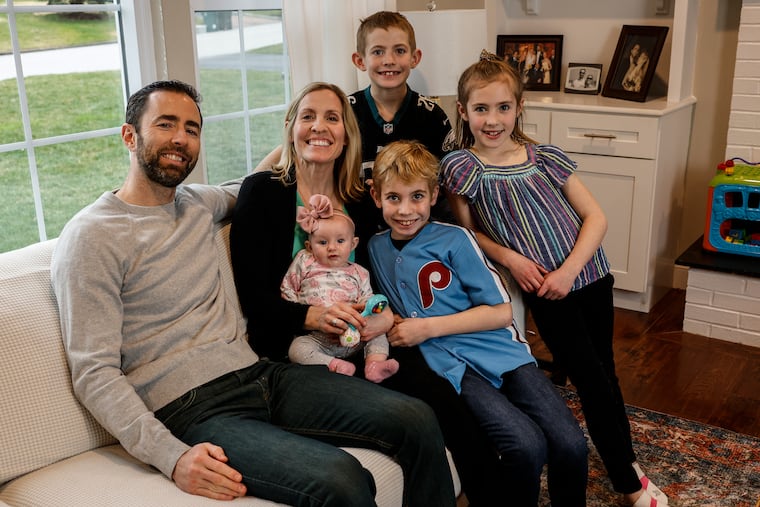The Philadelphia area is a “hot spot” for infant botulism. What causes this rare illness?
The Philadelphia area is a "hot spot" for infant botulism.

Kevin and Julie McMonagle’s nearly 3-month-old daughter was behaving oddly. Colleen wasn’t finishing her bottles, her pacifier kept falling out of her mouth, and her cry was as quiet as a kitten’s.
As the parents of four children, they rarely worried about sniffles and stomach bugs. Still, they took the baby to the emergency department at Children’s Hospital of Philadelphia’s King of Prussia hospital in an abundance of caution. Julie told the older kids she’d be home by dinner.
But the McMonagles ended up staying at the hospital for two weeks, as their baby girl fought off an illness they knew nothing about. Colleen had infant botulism, a rare, potentially deadly infection that affects the nervous system and can lead to paralysis. She was admitted to the pediatric intensive care unit and put on a ventilator when she started struggling to breathe.
The Philadelphia area, and in particular Montgomery County where the McMonagles live, is a hot spot for infant botulism. Pennsylvania has the second highest rate of infant botulism cases in the country, following California. The state health department reported 17 cases in 2019, representing 11% of the 152 cases reported nationally that year, according to the most recent available data from the Centers for Disease Control and Prevention.
“Pediatricians in other areas of the country may see one case in their entire career,” said Laura McGarry, a neurologist at CHOP. “In the first two years of residency, I had seen 10 to 12.”
There’s little families can do to avoid the risk of this uncommon ailment, so doctors say it’s important for parents here to know the signs of an infection.
Parents are often warned against giving infants honey because it is a known source of the bacteria spores that cause botulism. But the bacteria more commonly comes from microscopic specks of dirt inhaled while driving with the windows open, playing at a park, or strolling past neighborhood construction.
“We don’t want parents to feel they did something to cause this,” McGarry said. “It’s just something for people who live in this area to be mindful of.”
What is infant botulism
Infant botulism is caused when babies ingest C botulinum, a type of bacteria. The bacteria’s spores colonize in the large intestine and release a toxin that affects the nervous system.
Symptoms include changes in facial expressions, such as smiling less; slow feeding; constipation; and low energy.
If untreated, the toxin spreads and begins to cause paralysis, making it hard for babies to breathe and eat.
The illness can come on suddenly or gradually and can be hard to diagnose, because the symptoms may easily be mistaken for more common illnesses in babies and infants, said Karen Ravin, division chief for pediatric infectious diseases at Nemours Children’s Hospital in Delaware, who treats a few cases every year. Children under a year old are at greatest risk.
Early diagnosis is key to recovery, she said. Infant botulism is treated with an antitoxin, called BabyBIG, that’s manufactured by the California Department of Public Health. The medication’s antibodies bind to the toxin circulating in the body and neutralize it.
Before BabyBIG was approved by the Food and Drug Administration in 2003, the vast majority of infants would become so paralyzed they couldn’t move a finger or open their eyes, and needed to be on a ventilator for weeks before their body cleared the bacteria and they could begin to recover.
With medication, symptoms start to improve within 48 hours.
An average of 190 doses a year were distributed to hospitals in the United States between 2019 and 2023. About 13% of those doses — 24 a year — went to Pennsylvania. Each dose costs $57,300.
High concentration of cases in Philadelphia suburbs
Most cases of infant botulism are related to contaminated soil. Researchers have found hot spots of infant botulism in California and along a band of suburbs between Philadelphia’s Montgomery and Bucks counties, through central New Jersey to New York’s Long Island, said Sarah Long, a professor of pediatrics at Drexel University’s College of Medicine, who has studied botulism and infectious diseases.
Researchers aren’t sure what makes the soil in some areas more susceptible to the bacteria. The area may have a higher density of organisms that help the bacteria breed, or a greater likelihood of soil being disrupted from construction, she said.
Long, who researched infant botulism for years, also found a link between breastfeeding and botulism. Almost all of the cases she studied were among babies who had been breastfed, rather than formula-fed. Babies who are breastfed have a different gut microbiome composition that the bacteria may be better able to grow in.
Long cautioned that the correlation shouldn’t affect parents’ feeding decisions.
“You shouldn’t live in fear of infant botulism,” Long said. “It’s a very tricky, unusual, short-lived risk period.”
Quick diagnosis
Doctors assured the McMonagles, of Lafayette Hill, that there was nothing they could have done to prevent their daughter from getting sick, and that she’d begin to recover as soon as she got the medication.
Still, the parents were shaken after days in the NICU with their daughter hooked up to a mess of tubes and wires. Doctors took Colleen off the ventilator after a few days, but she was still too weak to breathe on her own, and they put her back on it so she could continue to regain her strength.
“I felt so defeated,” Julie McMonagle said. “You just don’t know. Everyone’s recovery story is different.”
After two weeks, the family went home.
Colleen is back to smiling, laughing and, now 5 months old, trying to keep up with her older siblings.